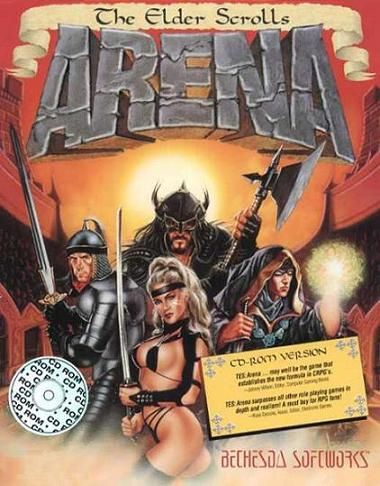Tags: Bethesda Softworks; Elder Scrolls: Arena
Once upon a time, in a land far, far away from Australia, there was a good company called Bethesda Softworks. During that fabled time, Bethesda used to release computer role-playing games, mostly open world (like their masterpieces Daggerfall and Morrowind) but also dungeon-crawling (like the underappreciated Battlespire). Unfortunately, the company went (creatively) bankrupt just after the release of the last Elder Scrolls game, Morrowind, in 2002, and all that remains of it now is the name.
It wasn't the 1996 Daggerfall that started the Elder Scrolls series' rise to fame, though. It was the simpler, half-forgotten The Elder Scrolls: Arena from 1994. In this look back at the often neglected title, esteemed community member Deuce Traveler tells you why Arena can, despite its shortcomings, be worth playing today - and how the experience of playing it differs from its less than stellar reputation. Have a snippet:
Read the full article (with pictures!): RPG Codex Retrospective Review: The Elder Scrolls: Arena (1994)
Once upon a time, in a land far, far away from Australia, there was a good company called Bethesda Softworks. During that fabled time, Bethesda used to release computer role-playing games, mostly open world (like their masterpieces Daggerfall and Morrowind) but also dungeon-crawling (like the underappreciated Battlespire). Unfortunately, the company went (creatively) bankrupt just after the release of the last Elder Scrolls game, Morrowind, in 2002, and all that remains of it now is the name.
It wasn't the 1996 Daggerfall that started the Elder Scrolls series' rise to fame, though. It was the simpler, half-forgotten The Elder Scrolls: Arena from 1994. In this look back at the often neglected title, esteemed community member Deuce Traveler tells you why Arena can, despite its shortcomings, be worth playing today - and how the experience of playing it differs from its less than stellar reputation. Have a snippet:
I had originally never intended to play The Elder Scrolls: Arena, as I'd heard enough about this imperfect creation from other RPG fans to keep me away from it. It was said that the game is unbalanced. That it feels incomplete. That its main quest and characters are shallow when compared with that of contemporary RPGs such as the Ultima games or Betrayal at Krondor. But in the end, I decided to give the game a go as part of a larger project I am working on, in order to ascertain these facts for myself. What I found was a game that is indeed quite unbalanced, with many gameplay elements that feel rushed and incomplete, and a main story arc filled with cliche fantasy tropes. And yet, the game was a total joy to play, like a B-movie that manages to be greater than the sum of its faults.
[...] Arena's main quest dungeons are surprisingly evocative. Certainly not the initial dungeon, which is a simple exercise in hacking and slashing, but the game's later dungeons are scattered with clues, which deliver deeper lore and all sorts of tales of tragedy. These tales speak of better times and ancient kingdoms felled long ago through wars and betrayals. For example, one memorable moment takes place upon entering an early dungeon, an abandoned keep where you find a sign forbidding violence and promoting peace within, followed by bloodstains and skeletal remains on the floor further down the hall. Deeper inside, you find messages suggesting that the last defenders of the keep were retreating further in hopes of finding safety. You find no further messages by them, a grim reminder that Tamriel is quite the dangerous world despite the power of the Imperial government.
The main quest dungeons are also fairly diverse in terms of aesthetic presentations. There's the initial dungeon which looks like a cross between a prison and a sewer, dungeons which take place in fallen and decrepit keeps, towers, outdoor gardens, and the game's final dungeon which starts in a palace. As the game progresses, your enemies change and become more difficult, though the last third becomes a bit repetitious through overuse of the same difficult monsters. Exploration is rewarded, with randomly generated treasure laying in hidden vaults off the direct paths. Sometimes keys have to be discovered before you can progress, and environmental hazards such as pits and lava are not uncommon. At times, you might even have to answer a riddle in order to proceed through a dungeon unmolested, encouraging even veteran players to fall towards the habit of saving the game constantly in case a mistaken reply has dire consequences. Often, failure to answer a riddle correctly will result in a tough combat encounter from which you can continue on if you survive, but there is at least one occasion where failure to answer correctly can break the quest line. In summary, dungeon explorations ranges between the interesting and the frustrating, but rarely is it boring.
[...] Arena's main quest dungeons are surprisingly evocative. Certainly not the initial dungeon, which is a simple exercise in hacking and slashing, but the game's later dungeons are scattered with clues, which deliver deeper lore and all sorts of tales of tragedy. These tales speak of better times and ancient kingdoms felled long ago through wars and betrayals. For example, one memorable moment takes place upon entering an early dungeon, an abandoned keep where you find a sign forbidding violence and promoting peace within, followed by bloodstains and skeletal remains on the floor further down the hall. Deeper inside, you find messages suggesting that the last defenders of the keep were retreating further in hopes of finding safety. You find no further messages by them, a grim reminder that Tamriel is quite the dangerous world despite the power of the Imperial government.
The main quest dungeons are also fairly diverse in terms of aesthetic presentations. There's the initial dungeon which looks like a cross between a prison and a sewer, dungeons which take place in fallen and decrepit keeps, towers, outdoor gardens, and the game's final dungeon which starts in a palace. As the game progresses, your enemies change and become more difficult, though the last third becomes a bit repetitious through overuse of the same difficult monsters. Exploration is rewarded, with randomly generated treasure laying in hidden vaults off the direct paths. Sometimes keys have to be discovered before you can progress, and environmental hazards such as pits and lava are not uncommon. At times, you might even have to answer a riddle in order to proceed through a dungeon unmolested, encouraging even veteran players to fall towards the habit of saving the game constantly in case a mistaken reply has dire consequences. Often, failure to answer a riddle correctly will result in a tough combat encounter from which you can continue on if you survive, but there is at least one occasion where failure to answer correctly can break the quest line. In summary, dungeon explorations ranges between the interesting and the frustrating, but rarely is it boring.
Read the full article (with pictures!): RPG Codex Retrospective Review: The Elder Scrolls: Arena (1994)







![Have Many Potato [2013] Codex 2013](/forums/smiles/campaign_tags/campaign_potato2013.png)
![The Year of Incline [2014] Codex 2014](/forums/smiles/campaign_tags/campaign_incline2014.png)




















 version? I'm going to guess: yes. I wonder how many console gamers found Caius :D
version? I'm going to guess: yes. I wonder how many console gamers found Caius :D






